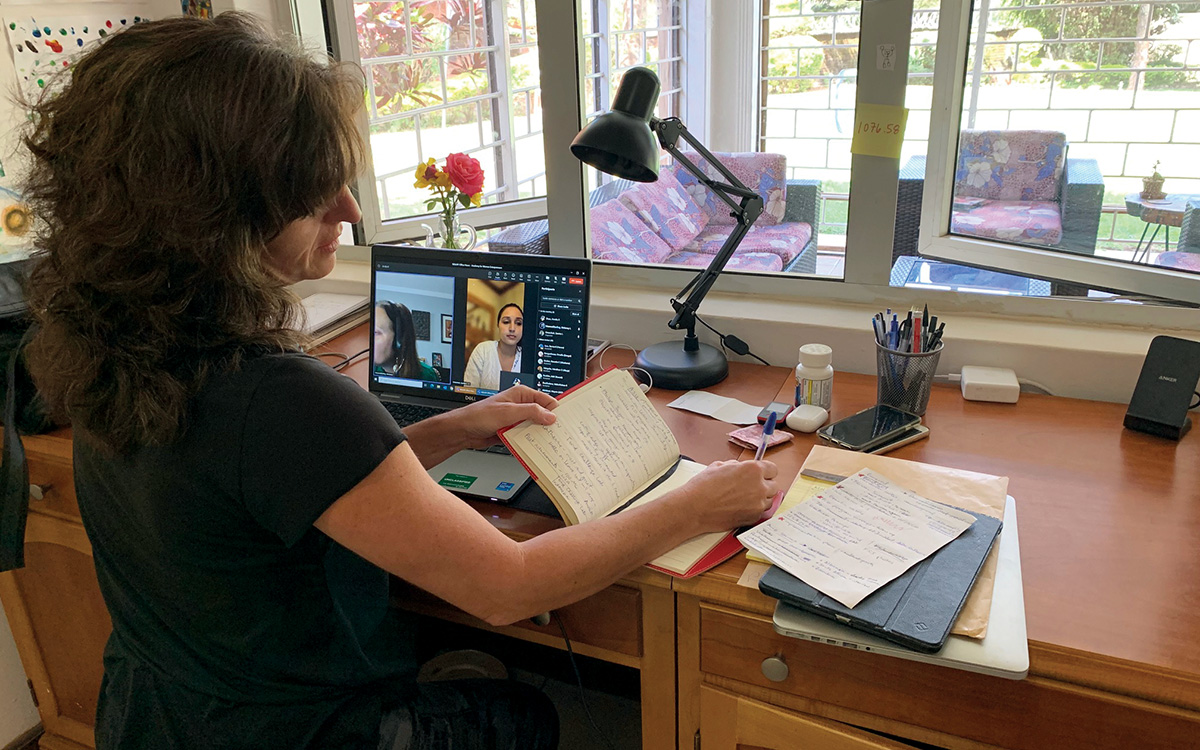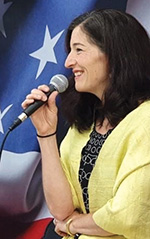Making Overseas Telework Better
Spurred by employees and aware of the benefits, officials at the State Department are working to remove roadblocks to remote work assignments.
BY AMELIA SHAW

Asha Beh, pictured here in her home office in Dhaka, was one of hundreds of Civil Service employees who benefited from a legislative fix to create greater pay equity among employees serving on DETO assignments.
Courtesy of Amelia Shaw
The past year has seen positive changes for federal employees who are serving on domestic employee teleworking overseas assignments (known as DETOs). Since the pandemic proved the efficacy of remote work arrangements, the significant increase in demand for DETOs has put a spotlight on the program.
Early in the year, a couple hundred Civil Service (CS) employees serving on DETOs in the State Department and interagency got a massive boost, thanks in part to the work of a committed group of CS employees, human resources personnel—and last December’s passage of the National Defense Authorization Act (NDAA).
The NDAA brought a welcome change because it included a provision for the Civil Service Federal Employee Serving Overseas Pay Equity Act, which enables Civil Service employees on DETOs to receive either the same overseas comparability pay that Foreign Service employees do, or their home office locality pay.
Prior to passage of the NDAA, Civil Service employees on DETO assignments had been taking whopping pay cuts (32 percent in 2021, up from 24 percent in 2015) because there is no overseas locality consideration in the General Services pay scale. When CS employees moved overseas, their salaries automatically defaulted down to base pay without Washington, D.C., locality pay or comparability pay of any kind.
More broadly, the change in pay equity is encouraging news for all federal workers and their spouses, whether Civil Service, Foreign Service, or military, because it signals the government’s commitment and willingness to adapt and meet the changing needs of the federal workforce.
DETOs at State Are on the Rise
Currently the State Department has around 250 employees under DETO arrangements stationed all over the world. Because of its flexibility, the DETO program has been gaining popularity and has grown rapidly at State since its advent in 2009.
The pandemic vastly reshaped the world’s remote work experience, and teleworking in some form has become normalized across the job market—and the federal government. At State, the pandemic forced the department to make much-needed technological upgrades to its online communications platforms and cloud-based computing, which have facilitated the transition for parts of the federal workforce to a remote work environment, and this has positive implications for workforce recruitment and retention.
In line with national trends showing that roughly a third of Americans in a position to do so work from home, more State Department employees say they prefer working remotely in some form. According to the American Foreign Service Association’s (AFSA) Future of Foreign Service survey of 1,800 active AFSA members, 72 percent of U.S.-based staff reported partly or fully working from home at the time of the survey, and a significant number of those who were not expressed a desire to do so. A majority of respondents cited workplace flexibility as the top benefit.
As reported in an April 2022 article in State Magazine, DETOs have also been embraced by State’s Bureau of Global Talent Management (GTM) because they help the department fill staffing gaps and reduce the loss of talent. In fact, GTM currently employs the highest number of active DETOs of any office in the State Department, followed by the Bureau of Consular Affairs.
So by all indications, the DETO program is likely to expand.

While serving on a DETO from Malawi, FSO Amelia Shaw advocated with GTM for changes to the “same-status” rule to give greater support to officers returning to FSI for long-term training.
Courtesy of Amelia Shaw
Increased Flexibility, but It’s Complicated
There are many clear benefits of DETO arrangements. They allow highly trained employees to contribute meaningfully to government service. They can be cost-effective. And they keep families together. But the issue is complicated and has produced adverse effects on staff depending on their hiring category.
For example, members of the Foreign Service who are physically overseas on a DETO are considered domestic employees in most things except salary. They receive overseas comparability pay (OCP) for statutory reasons. However, they forgo any local mission-based entitlements such as post differential or cost-of-living allowance, which results in a pay cut. Further, FS DETOs are not entitled to home leave and have experienced challenges with housing allowances when returning to the Foreign Service Institute (FSI) for long-term training under “same status” rules for tandem couples.
In addition, some officers have voiced dismay over the lack of clarity in how to find and apply for DETO opportunities at State. Others have experienced long delays in getting their DETO paperwork authorized, forcing them to take leave without pay while they wait for approvals. Many have also struggled with obtaining adequate computer and office equipment to do their DETO job, often paying out of pocket.
Military spouses share some of these issues and have also had their own share of problems in securing DETO agreements with Department of State. The Defense Department and State are now in negotiation on these matters. And in June 2023 the White House issued an executive order—“Advancing Economic Security for Military and Veteran Spouses, Military Caregivers, and Survivors”—that, among other things, specifically directs agencies across the executive branch to develop common standards for application processing and approvals for military spouses seeking DETO employment.
Working on a Fix at State—the Backstory
Many people have been working behind the scenes to find creative solutions to even the most intractable problems—such as the Civil Service pay disparity, which even some GTM insiders believed was virtually unsolvable due to the statutory nature of the problem. The backstory of how pay parity in DETOs was achieved offers vital lessons to anyone at State interested in the power of internal advocacy.
In 2021 CS employee Michelle Neyland was looking for a way to accompany her Foreign Service spouse overseas and still hold on to her own federal job of 14 years. A DETO position seemed like a great way to keep the family together while continuing her career with State.
“We don’t have that many options as eligible family members [EFMs] overseas. Sometimes we can find jobs in the local economy or the embassy,” Neyland said. But even though U.S. missions make every effort to create viable employment for EFMs, embassy jobs are not always available and may not match the more sophisticated professional skill sets of CS employees.
The DETO program has been gaining popularity and has grown rapidly at State since its advent in 2009.
So Neyland took a DETO job—and the 32 percent pay cut—and immediately began working on a fix. She organized a committee of like-minded colleagues from both CS and FS ranks to form an internal advocacy group. They created communications channels on Teams and Facebook, participated in town halls, and requested meetings with senior leadership. They researched the Foreign Affairs Manual, the Foreign Affairs Handbooks, and statutory guidelines; and they consulted with State Department lawyers, concluding that the only viable solution was a legislative fix.
The network and the advocacy effort grew in size and momentum, involving more than 65 employees across the State Department, including Military and DoD Families @ State, Balancing Act, and other employee groups. They worked closely with GTM, management, and the Secretary’s Office of Diversity and Inclusion; consulted with unions AFSA and AFGE to explore legal options; and connected with FS employees serving as Pearson Fellows in congressional offices.
Finally, with support from AFSA and two Pearson Fellows, Annie Wiktowy and James Allman-Gulino, the coalition had success on the Hill. Congressman Joaquin Castro’s (D-Texas) office drafted legislation, which Senator Chris Van Hollen’s (D-Md.) office successfully introduced as an amendment to the Senate Foreign Relations Committee’s State Department Authorization Bill, and it made its way successfully into the National Defense Authorization Act (NDAA).
The NDAA was signed by President Joe Biden on Dec. 23, 2022, with the hard-fought CS DETO pay equity language included in Section 9717, now allowing for CS DETOs to receive either the same overseas comparability pay that FS employees do or their home office locality pay, whichever is lower.
Two years in the making, this was a stunning legislative fix and a massive win for hundreds of Civil Service, Foreign Service, and military families that immediately improves DEIA and retention outcomes at the State Department. It was announced to State employees by GTM on Jan. 5, 2023, in a cable aptly titled “Taking Care of People.”
Advocacy + Institutional Buy-in

Michelle Neyland was instrumental in galvanizing efforts to advocate for pay equity for Civil Service employees serving on DETO assignments.
Courtesy of Amelia Shaw
This extraordinary success can be attributed to the advocacy group’s careful organizing and GTM’s proactive efforts to find solutions. The bureau’s WorkLife Division is effusive in its enthusiasm to grow the DETO program and has been working hard to tackle some of the biggest complaints with creativity and empathy.
For one thing, GTM is developing an app to increase efficiency and transparency in applying for DETO and remote work, a significant step forward for streamlining the onboarding process. Expected to launch sometime in 2023, the new technology will eliminate the onerous system of sending PDF documents back and forth for signature between a multitude of offices. Electronic signatures will allow officers to track and proactively support approvals, which will likely make the process much faster and relieve a lot of officers’ stress and anxiety during job transitions.
GTM is aware of other challenges officers face and is working to resolve them. It is improving its data management capacity, so it can better understand its DETO population and make informed policy changes to better serve the department’s workforce needs. In April, GTM released a cable announcing that they had removed the “same-status” policy that inadvertently disadvantaged tandem couples assigned to long-term FSI training, a move that will offer more flexibility to families when one officer is returning from DETO or leave-without-pay status. By all accounts, GTM is making good on its word to take care of people in collaboration with employee advocates.
“I am feeling hopeful,” Neyland said. “Our advocacy effort worked because it included so many dedicated individuals from across the State Department,” she said, adding that this integrated grassroots approach could help solve other seemingly intractable problems.
Teleworking is clearly here to stay. It’s good for officers, it’s good for families, and it’s good for the State Department. As we’ve learned from the CS pay disparity example, we all have a vested interest in making the overseas teleworking environment a better place.
And by working together, we just might succeed.
When sharing or linking to FSJ articles online, which we welcome and encourage, please be sure to cite the magazine (The Foreign Service Journal) and the month and year of publication. Please check the permissions page for further details.
Read More...
- “Digital Diplomacy: Will State Ever Take the Plunge?” by Amelia Shaw, The Foreign Service Journal, May 2017
- “Lessons from Silicon Valley: Practical Suggestions for a Modern Workplace” by Andrew R. Moore, The Foreign Service Journal, June 2020
- “Commercial Diplomacy Strong—Raising the Bar in the Virtual Era” by Aileen Nandi, The Foreign Service Journal, April 2021





